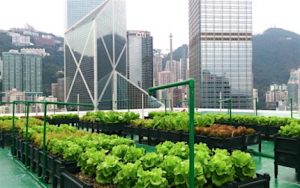
Image Source: http://www.cityfarmer.info/2016/01/30/hong-kongs-wild-root-organic-farm-teaches-urban-farming/
One of the most promising possible solutions to an increasingly at-risk world food system is the concept of urban farming. Already a popular initiative and social movement in many cities, urban farming brings people closer to their food and vice versa. We already have heard compelling arguments from Authors like Pollan, and seen undeniable evidence via ethnographic studies of non-Western cultures, that the more connected people are with the food they eat–from growing the food to cooking it–usually the more sustainable, environmentally, politically, and socially responsible they are in regards to food, and it encourages conscientious respect for the whole process of feeding oneself.
As populations of cities surge and expand, more and more of the world’s population becomes greatly distanced from their food’s origins. Additionally, urban sprawl consumes more and more land area that was previously available for agriculture. This happens not only in large cities, but everywhere there is population growth. In my hometown, for example, just over the past thirty-or-so years roughly 95% of what used to be orchards has been replaced by high-carbon-footprint single-family housing. That same trend is echoed throughout the nation and the world, and not surprisingly as a result we have seen shortages of certain crops and/or spikes in prices, which affects global health and local economies.
Urban farming is the realistic application of what is so often seen in futuristic science fiction movies–outer space colonies or space stations with multi-tiered facilities of plant farming for the purpose of supplying the needed food of the population. This is not science fiction; it is already possible and has been implemented in many places. Advancements in farming such as hydroponics and artificial UV supply, all using sustainable and renewable sources of electricity and water, are building blocks of future farming in an urban setting. Localizing food production will cut down on fossil fuel usage for transportation and storage. Being able to control the ambient environmental conditions of an urban growing operation reduces the contingencies for natural challenges like drought and unfertile soil. And perhaps one of the most significant benefits, as I mentioned at the start of this post, is promoting a closer connection to our food. Certain cities have seen great success with programs designed to increase health and economic stability by getting people to be hands-on with the whole process from farm to table.
